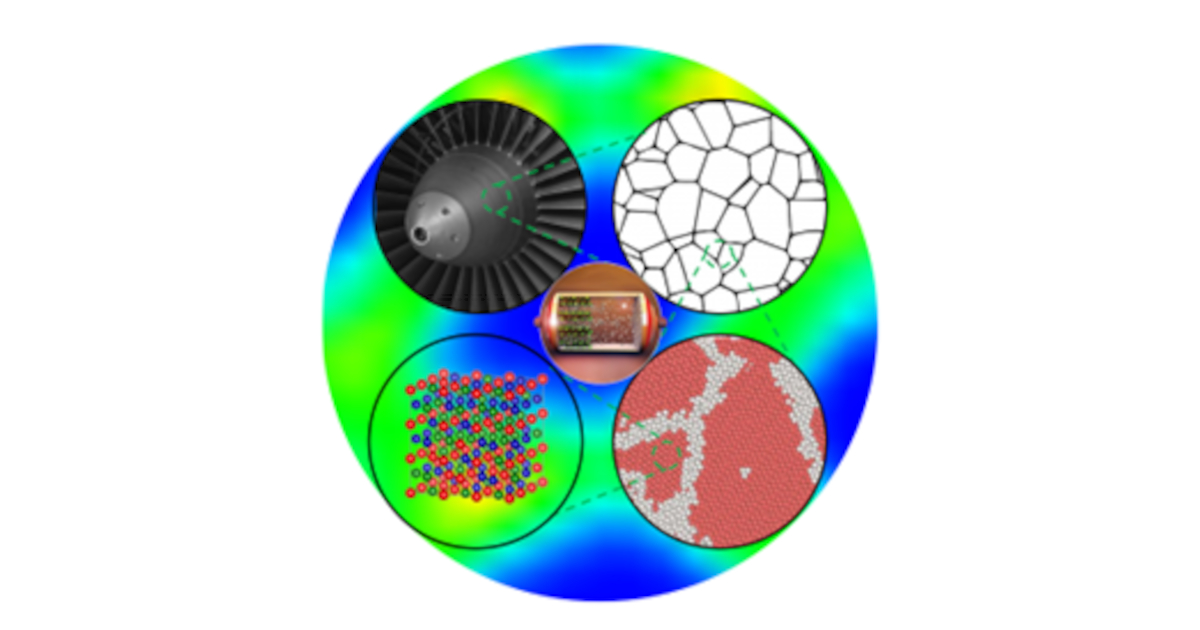Multiscale Simulation of Advanced Materials and Structures
A special issue of Materials (ISSN 1996-1944). This special issue belongs to the section "Materials Simulation and Design".
Deadline for manuscript submissions: 20 December 2025 | Viewed by 367

Special Issue Editors
Interests: multiscale computational material science; AI for material science; high-entropy alloys; intermetallics; functional materials; material process simulation
Interests: first principles; elastic constants; machine learning; high-entropy alloys; alloys design; CALPHAD
Special Issues, Collections and Topics in MDPI journals
Special Issue Information
Dear Colleagues,
Recently, with the emergence, fast spread, and rapid implementation of AI for science (AI4S) in ubiquitous fields, AI for material science based on the well-known Materials Genome Initiative (MGI) has revolutionized material discovery by integrating computational design, experimental validation, and data-driven approaches. With the rapid development of the MGI, the computational design of materials, especially the multiscale simulation of materials, has attracted increasing attention among the material science community. As a result, we are launching a Special Issue entitled “Multiscale Simulation of Advanced Materials and Structures”. This Special Issue will harness the synergy between MGI principles and multiscale methodologies to address major challenges in designing advanced materials and structures for applications in aerospace, energy, biomedical systems, and sustainable infrastructure. We invite contributions that explore innovative multiscale frameworks spanning from quantum to continuum scale and up to device or component scale, as well as material modeling, machine learning-augmented simulations, and high-throughput computational strategies aligned with MGI’s vision. Topics of interest include, but are not limited to, the following:
- Reviews, perspectives, opinions, and case studies on AI in material science;
- Reviews, perspectives, opinions, and case studies on the Material Genome Engineering Initiative;
- Furthering our atomic and electronic understanding of the structure and properties of advanced materials and devices;
- Thermodynamic and kinetic descriptions of the material structures of multi-component and heterogeneous systems of metallic and inorganic materials., such as CALPHAD;
- Furthering our understanding of the evolution of phases, dislocations, and phase boundaries in mesoscale microstructures;
- Furthering our understanding of the reaction and response of materials or components under an external single- or multiphysical field, such as a force field, electric field, thermal field, or hybrid or time-dependent external field;
- Damage, degradation, failure mechanisms, reliability assessments, and lifetime extendable strategies in materials, devices, and components under harsh service conditions;
- The experimental verification of previous or current theoretical results.
Join us in shaping the future of material innovation—submit your research breakthroughs to help drive the convergence of multiscale simulation, artificial intelligence, and transformative engineering.
Prof. Dr. Bo Wu
Dr. Mingqing Liao
Guest Editors
Manuscript Submission Information
Manuscripts should be submitted online at www.mdpi.com by registering and logging in to this website. Once you are registered, click here to go to the submission form. Manuscripts can be submitted until the deadline. All submissions that pass pre-check are peer-reviewed. Accepted papers will be published continuously in the journal (as soon as accepted) and will be listed together on the special issue website. Research articles, review articles as well as short communications are invited. For planned papers, a title and short abstract (about 100 words) can be sent to the Editorial Office for announcement on this website.
Submitted manuscripts should not have been published previously, nor be under consideration for publication elsewhere (except conference proceedings papers). All manuscripts are thoroughly refereed through a single-blind peer-review process. A guide for authors and other relevant information for submission of manuscripts is available on the Instructions for Authors page. Materials is an international peer-reviewed open access semimonthly journal published by MDPI.
Please visit the Instructions for Authors page before submitting a manuscript. The Article Processing Charge (APC) for publication in this open access journal is 2600 CHF (Swiss Francs). Submitted papers should be well formatted and use good English. Authors may use MDPI's English editing service prior to publication or during author revisions.
Keywords
- microstructure and properties
- multiscale modeling
- computational material science
- material genome initiative
- machine learning
- database
- CALPHAD
- first-principle calculations
- multiphysical field
Benefits of Publishing in a Special Issue
- Ease of navigation: Grouping papers by topic helps scholars navigate broad scope journals more efficiently.
- Greater discoverability: Special Issues support the reach and impact of scientific research. Articles in Special Issues are more discoverable and cited more frequently.
- Expansion of research network: Special Issues facilitate connections among authors, fostering scientific collaborations.
- External promotion: Articles in Special Issues are often promoted through the journal's social media, increasing their visibility.
- Reprint: MDPI Books provides the opportunity to republish successful Special Issues in book format, both online and in print.
Further information on MDPI's Special Issue policies can be found here.







